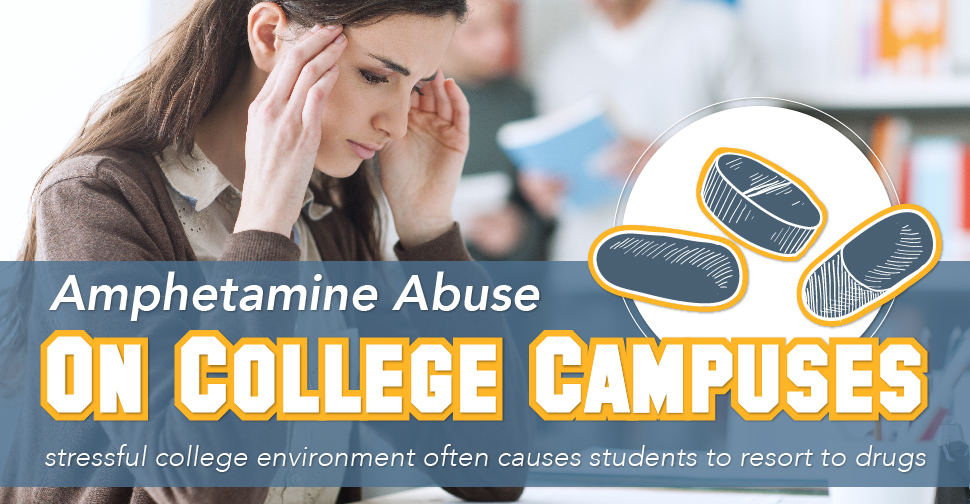
Imagine a college student cramming every bit of information their brain can muster in order to pass and facing an exhausting daily routine of waking early, going to class, visiting with friends, participating in campus events, and balancing important self-care such as exercise and eating.
Is it any surprise that so many students feel overwhelmed? Unfortunately, that stressful college environment often causes students to resort to drugs, such as prescription stimulants or amphetamines as a way to heighten everyday functioning in a high-stakes environment.
Types Of Amphetamines And Why They Exist
Prescription medications categorized as stimulants or amphetamines include Adderall, Concerta, Ritalin, Methylin, and Metadate. Each of these drugs are considered a Schedule II controlled substance, which means they are recognized as having beneficial medical purposes, but also carry a high risk for dependency.
Attention Deficit Disorder (ADD) and Attention Deficit Hyperactivity Disorder (ADHD) are neurobehavioral disorders that inhibit everyday functioning. These stimulants are often prescribed as a way to help them focus.
How Amphetamines Work
For people with a disorder such as ADHD, a prescribed amphetamine is often fundamental for a healthy life. It can help them feel more focused and alleviate academic, social, and relationship functional impairments. Learning and language difficulties can also be alleviated. Unfortunately, these amphetamines are often misused by students with or without a prescription.
How College Students Begin Using
About 60% of patients diagnosed with ADHD are treated with a stimulant. This means that prescription medications are quite accessible in a college atmosphere. And college students are often drawn to their ability to help them focus. Even students who do not have a diagnosis of ADD or ADHD are drawn to taking an amphetamine for one of the following reasons:
- Increased energy
- Heightened focus/attention span
- A sense of euphoria or “high”
Risks
A 2012 research study published by the U.S. National Library of Medicine states that the majority of articles or discussions on amphetamine use fail to mention the risks posed to people who do not actually have ADD or ADHD.
The National Library of Medicine brings to light many health problems or risks that can take place with amphetamine use in individuals who do not actually need the medication. These include:
- Psychosis
- Cardiomyopathy
- Myocardial infarction
- Sudden death
Prevalence Of Use
Despite the risks associated with the misuse of amphetamines, many college students continue to turn to stimulants as a form of escape or to increase their academic, social, or athletic performance. And unfortunately, statistics bears out this increase.
For example, Pharmacotherapy performed a survey on a random sample of 4580 college students and found that 382 of them had misused prescription stimulants in the past year, particularly Adderall and Ritalin.
Gender also seems to be a factor associated with the use of stimulants. Males are twice as likely to misuse an amphetamine than females. Finally, it is important to put the prevalence of the misuse of amphetamines into perspective: the only drugs on college campuses that are used more than stimulants are marijuana and alcohol.
Surveys also show that college students are twice as likely to be using an amphetamine than a person their age who is not attending college.
Getting Addicted
People who have regularly used amphetamines often get emotionally addicted to the rush of amphetamines. In addition, the brain and body become dependent on the chemicals provided by the amphetamine, leading to uncomfortable withdrawal symptoms should they try to quit. As a result, they keep using, even when they no longer require that burst of energy.
Treatment For Amphetamine Addiction
 The risks associated with the misuse of amphetamines cannot be denied. No matter the level of dependency on stimulants that you or a loved one is experiencing, it is imperative that the proper medical treatment is heeded in a timely fashion. So please don’t hesitate to contact us at DrugRehab.org to begin a journey towards freedom and recovery.
The risks associated with the misuse of amphetamines cannot be denied. No matter the level of dependency on stimulants that you or a loved one is experiencing, it is imperative that the proper medical treatment is heeded in a timely fashion. So please don’t hesitate to contact us at DrugRehab.org to begin a journey towards freedom and recovery.

